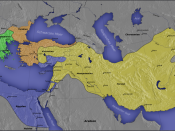Hellenistic Judaism- Still Prevalent Today
Comfort, leisure, serenity, prosperity, and dedication are only an understatement of the amazing era in Jewish history in Jerusalem. At the start of the epoch of the Second Temple, the denizens of Jerusalem adapted to new life quite easily to the postexilic period after the Babylonian exile had spewed them out of their homeland. The rebuilding of the Temple gave them new hope and faith, rejuvenating their spirituality. The Jews lived contently and in peace with themselves as well as their Creator. However, their material and spiritual contentment was short-lived. Their tranquil lifestyles gradually transformed into a nightmare, which was all too familiar. The arrival of the Greeks with their innovative and unique lifestyle initiated what resulted in one of the most tumultuous and confusing periods in Jewish history. The introduction of Hellenism and its doctrines evoked a two-fold reaction: while many viewed this
culture as seductive, fresh, and liberating, others grew increasingly afraid fearing a complete revolution and destruction of the Jewish faith.
Hellenistic influences viz. education, standard of living, dogmas, and culture were all progressively publicized and steadily accepted by numerous Jews. This epoch in Jewish history has been described by historians as the first religious persecution. Countless others would follow in the centuries to come. Do we not notice the "new", seductive, and luring cultures surrounding us? Do we not
detect the assimilation and the imposition of the secular world upon the Jewish nation? The force of the Hellenism and the consequences, which followed, can be paralleled to our era. Hellenism left a tremendous long-term impact on Judaic values, systems, and goals, which altered Amirian Judaism's dogmas till present day. Jewish education, standard of living, and social facets were each affected and in turn shaped a new Jewish lifestyle. Did we...



Hellenistic Judaism- Still Prevalent Today.
This essay is fairly well written. There are a few grammatical errors such as run-on sentences, but overall it is well done. The thesis is stated in the form of a question, which makes it weak. A thesis statement should be assertive and precise. Although this paper is filled with very good facts and source material, it is difficult to see where the author is going with his or her argument. This is simply due to the weak thesis, which does not lay out the argumentive assertion well since it is a question rather than a statement. I am impressed with the source evidence and the author's use of it. He or she does an excellent job of giving the reader a solid foundation.
0 out of 0 people found this comment useful.